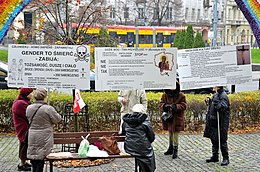
Back الحركة المناهضة للنوع الاجتماعي Arabic Antigenderové hnutí Czech Anti-Gender-Bewegung German Movimiento antigénero Spanish Anti-gender-liike Finnish Antirodni pokret Croatian Հակագենդերային շարժում Armenian 反ジェンダー運動 Japanese 젠더론 반대운동 Korean Anti-genderbeweging Dutch

| Part of a series on |
| Transgender topics |
|---|
|
|

The anti-gender movement is an international movement that opposes what it refers to as "gender ideology", "gender theory" or "genderism",[1] terms which cover a variety of issues[1] and do not have a coherent definition.[2] Members of the anti-gender movement primarily include those of the political right-wing and far right, such as right-wing populists, conservatives, and Christian fundamentalists.[3][4] It has been linked to a shift away from liberal democracy and towards right-wing populism.[5] Anti-gender rhetoric has seen increasing circulation in trans-exclusionary radical feminist (TERF) discourse since 2016.[6] Different members of the anti-gender movement variously oppose some LGBT rights, some reproductive rights, government gender policies, gender equality, gender mainstreaming, and gender studies academic departments.[1][7][8] The Canadian Security Intelligence Service has linked the anti-gender movement to the risk of "extreme violence" against the LGBT+ community.[9]
The term gender ideology has been described by academics Stefanie Mayer and Birgit Sauer as an "empty signifier",[2] and by Agnieszka Graff as a "great name for all that conservative Catholics despise".[10] The idea of gender ideology has been described by some as a moral panic,[11][12] or a conspiracy theory, as it alleges that there is a secret cabal out to undermine society.[13][14] A report by the European Parliament linked the rise of the anti-gender movement in Europe to disinformation campaigns that are sponsored in large part by Russia.[15]
The movement derives from Catholic theology and can be dated to the late twentieth century, but the protests that brought the movement to attention did not start until around 2012–2013.[16] Gender researcher Andrea Pető states that the anti-gender movement is not a form of classical anti-feminism but instead "a fundamentally new phenomenon that was launched to establish a new world order".[17]
- ^ a b c Kováts 2016, p. 175.
- ^ a b Mayer & Sauer 2017, p. 23.
- ^ "The transnational anti-gender movement in Europe | Gunda-Werner-Institut". Heinrich-Böll-Stiftung. Retrieved 3 September 2022.
- ^ Kováts & Põim 2015, p. 126.
- ^ Walton, Kate. "Opposition to gender equality around the world is connected, well funded and spreading. Here's what you need to know about the anti-gender movement". CNN. Retrieved 29 March 2024.
- ^ Cite error: The named reference
Pearcewas invoked but never defined (see the help page). - ^ Kováts & Põim 2015, p. 11.
- ^ Rawłuszko 2019, p. 2.
- ^ Cite error: The named reference
cbcwas invoked but never defined (see the help page). - ^ Graff 2016, p. 268.
- ^ Careaga-Pérez 2016, p. 251.
- ^ Żuk & Żuk 2019, p. 1.
- ^ Marchlewska et al. 2019, p. 766.
- ^ Zottola, Angela; Borba, Rodrigo (2022). ""Gender ideology" and the discursive infrastructure of a transnational conspiracy theory". Conspiracy Theory Discourses. John Benjamins. pp. 465–488 [473].
- ^ Cite error: The named reference
Disinformationwas invoked but never defined (see the help page). - ^ Kuhar & Paternotte 2017, p. 12.
- ^ Pető 2021, p. 42.
© MMXXIII Rich X Search. We shall prevail. All rights reserved. Rich X Search